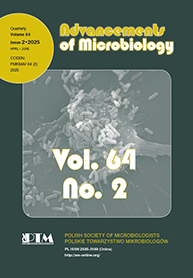ZAKAŻENIA ORTOMYKSOWIRUSAMI U OSÓB Z ZABURZENIAMI ODPORNOŚCI
1. Wstęp. 2. Ogólna budowa wirusów grypy 3. Zakażenia wirusami grypy u pacjentów z niedoborami immunologicznymi 4. Powikłania pogrypowe u osób z upośledzoną odpornością 5. Profilaktyka zakażeń wirusami grypy 6. Metody diagnostyczne stosowane w badaniu zakażeń wirusami grypy 7. Terapia zakażeń powodowanych przez ortomyksowirusy 8. Podsumowanie
Abstract: Orthomyxoviridae is a family of enveloped viruses which contain a segmented negative strand RNA genome. They cause recurrent, seasonal epidemics and occasional global pandemics with different levels of morbidity and mortality, especially in transplant recipients. Infections with influenza A and/or B viruses may lead to complications including viral pneumonia, secondary bacterial infections and graft dysfunction. The ability of influenza viruses to undergo reassortment events ensures constant generation of new strains with unpredictable degrees of pathogenicity and transmissibility. Molecular diagnostics are preferred over other diagnostic methods, if available. Influenza vaccination is well tolerated and provides protective benefit in most immunocompromised hosts; in those with contraindications to vaccination or in whom responses are predicted to be poor, antivirals may be considered. Antiviral therapy is associated with improved outcomes in transplant patients and treatment should be continued until clinical and virologic response have been documented. Resistance, particularly in patients infected with the pandemic influenza A/H1N1, should be considered and treated with an antiviral with predictable activity.
1. Introduction. 2. Morphology of othromyxoviruses. 3. Influenza virus infections in immunocompromised hosts. 4. Post-influenza infectious complications. 5. Prophylaxis of influenza. 6. Diagnostics in influenza infections. 7. Treatment of infection caused by othomyxoviruses. 8. Summary

